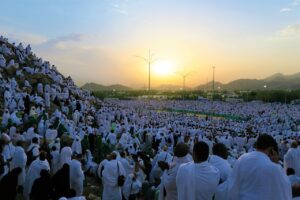In a recent enlightening discussion featured on the Blogging Theology YouTube channel, Dr. Abdullah Ali, a renowned scholar in Islamic law and prophetic tradition elucidates the issues surrounding race and identity within Islamic contexts. The conversation, hosted by Paul of Blogging Theology, tackles critical questions surrounding the historical understanding of the term “Negro,” its implications in Arabic contexts, and the complex discussions around the Prophet Muhammad’s complexion.
Key Insights from the Discussion:
The Academic Perspective on Language and Identity:
Dr. Ali emphasizes that his recent book, The Negro in Arab Muslim Consciousness, is grounded in scholarly rigor. He points out that the word “Negro,” often used interchangeably with “black,” has varying implications historically and linguistically. He suggests that this term, and others related to it in Arabic, served distinct purposes in understanding racial identities, especially during the Enlightenment period when the term began to take on several negative connotations.
Racial Identity and Historical Context:
The video examines how historians and scholars have traditionally differentiated between groups such as the Qur’an’s Ethiopian and Kushite peoples and their relation to the “Negro.” Dr. Ali argues this differentiation is pivotal in understanding the evolution of race as a concept in Arab culture. He further explains how the older paradigms of racial categorization are often overlooked or misinterpreted in contemporary discussions.
The Prophet’s Complexion:
Delving into the contentious debates around the Prophet Muhammad’s complexion, Dr. Ali explains that the terms “white” or “black” in historical Arab contexts do not align with contemporary racial classifications. He shares evidence from hadith literature that describes the Prophet’s appearance in a manner that resists simple categorization. Instead, Dr. Ali affirms the Prophet’s heritage reflects a range of complex identities, arguing that the true essence of a person’s worth is not determined by their skin color but by their character and piety.
Addressing Modern Racial Issues:
The discussion also addresses the modern implications of race within Muslim communities, and how Western ideologies might influence perceptions about race and identity. Dr. Ali suggests that the solutions to racial issues can often be found within Islamic teachings that emphasize unity and equality among all people. The dialogue encourages a return to these foundational values, asserting that Islam possesses the potential to challenge contemporary racial biases.
Call to Action:
In closing, Dr. Ali encourages Muslim communities to engage in an honest discourse about race and identity. He highlights the importance of introspection within the community, regarding how issues of race, privilege, and discrimination manifest in today’s society.
Conclusion:
Dr. Abdullah Ali’s academic insights challenge us to rethink our understanding of race from an Islamic perspective, generating essential conversations that resonate deeply within our communities today. His work invites further exploration and dialogue aimed at fostering inclusivity, respect, and understanding.
For those interested, Dr. Ali’s book is available on Amazon, offering a profound analysis that could stir consciousness and promote critical reflection within the broader discourse on race and identity in modernity.
Let’s all take a moment to reflect on how we can contribute to this vital conversation, understanding that our differences can be our strengths when approached with knowledge, compassion, and mutual respect.
Listen to the full conversation on Blogging Theology for an engaging exploration of these topics.
Akanke is a native of Atlanta who now resides in Dayton, Ohio. She has also lived in Bahrain, Saudi Arabia, and Grenada, West Indies. She discovered Islam in 1994, and her faith, spirituality, and personal development have been the driving force in her life ever since. A graduate of Georgia State University with a degree in Communication, Akanke focused on film, TV, and cultural anthropology during her studies. Her career is diverse, and her interests span various media platforms. From producing TV and radio shows to creating documentaries, coaching individuals towards empowerment, creating and exhibiting unique abstract paintings, providing public speaking guidance, delivering leadership training, and lending her voiceover talent to various projects, she strives sincerely to make a lasting and authentic impact wherever she goes. Akanke has been a dedicated supporter of MANA since 2007, currently serving as the organization’s Board Vice President. In this role, she plays a key part in shaping the organization’s vision and strategy. Additionally, she serves as the part-time Communications Director, where she excels in crafting compelling communication tools, including newsletters, articles, graphic designs, and social media campaigns. Through her work with MANA, Akanke continues to make a positive difference, using her talents and passion to uplift and inspire others.





